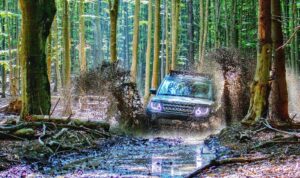Anti-lock Brake System (ABS) is an improved version of normal vehicle brake systems to stop locking wheels while braking and avoid understeering.
But there are a lot of debates out there about driving with ABS on, off-roads.
Really does ABS help on off roads?
The answer is YES and NO. Because even in off roading, according to the road surface the amount of traction is different.
There are some situations where you can stop a vehicle in less distance without ABS than with ABS.
In this article I wish to discuss using ABS while off roading in different viewpoints.
So I think this is going to be an interesting article for our off roading pals. I wish to go through the following order.
Contents
How ABS works.
As a start I’ll tell you briefly why we need ABS and how the ABS works.
On hard surfaces like tarmac roads with slippery patches (snow/ gravel/ mud/ sand) there’s a high chance of slipping the wheels if brakes are applied.
The reason for slipping is when brakes locked the wheels, the friction among the tire and road surface reduces more.
According to physics the sliding friction is lower than the rolling friction.
It means if you suddenly apply brakes and lock your wheels the stopping force is lower than applying brakes with intervals.
But practically it’s hard to do this for a human because we tend to apply brakes as hard as possible if something obstructs our road suddenly.
That’s where the ABS comes handy. ABS automatically applies brake with intervals avoiding the wheels locking even if you press the brake pedal as hard as possible.
ABS does this with the help of 4 sensors on the four wheels and the help of a computer unit.
Those sensors give the data about wheels speed to the computer unit.
If a wheel locks when braking and tends to slip, that computer system identifies it through the relevant sensor and releases the brake of that relevant wheel and applies it again.
That is a very quick process. This can happen 15 – 25 cycles per second in modern cars.
So I think you can imagine how fast this is. So that is impossible for a human being to do it manually.
With this releasing and reapplying the brakes many times a second, wheels rolling friction remains throughout the braking.
Because computer unit releases the wheels every time when it locks and lost it’s traction.
So a vehicle can stop in low distance than without ABS on this kind of hard surface.
Situation that ABS not helpful in off-roading
In off roading, things are going to change. Above mentioned brake modulating things help to stop vehicles quickly on hard surfaces.
But when off roading most of the time tires have to deal with mud, gravel or sand.
Let’s get an example to clarify what’s going on with ABS when off roading.
Think of a situation where you try to decline a muddy slippery hill while off roading.
In the bottom of that decline there are some rocks or obstacles.
So that you have to stop before the bottom to decide a better line to go through those rocks.
In this situation if you drive with a vehicle with normal ABS what happens?
When you push the brake pedal while declining wheels easily tend to lock due to loss of friction.
But the ABS system doesn’t allow wheel locking. So every time ABS detects wheel locking, it releases the brake.
How hard you push the brake pedal down, ABS release locking of tires.
So that in this slippery decline the vehicle will not stop with ABS , until it hits the rocks at the bottom of the hill.
Then you may ask, Is there an advantage of disengaging ABS in this kind of situation? Is it possible to stop this vehicle without ABS?
Yes there’s an advantage without ABS in this kind of situation.
Think now that the vehicle drives down with ABS disengaged. Now you push the brake pedal hard. Wheels get locked.
Now there’s no automatic releasing of brakes without ABS. So wheels skid on this muddy slippery decline.
With this skidding tire threads cut down muddy surfaces and try to grip the surface with more friction.
At the same time there will occur mud wedges in front of the tires, that helps to slow down the vehicle more.
With those extra forces the vehicle gets more support to stop before the bottom than with ABS engaged.
But keep in mind this is just an example to explain how things happen on off road surfaces. It’s not a good idea to lock your wheels all the way down in a slippery decline every time.
Situations that ABS helpful in off roading
There are many situations where ABS comes handy when off roading. Apart from the above discussed kind of extreme situations, it’s best to drive with ABS.
While you drive off the pavement there will be sudden road crossings of wild animal like deer.
In such a situation ABS will surely help you to stop your vehicle quickly.
As far as your road surface is hard enough ABS will help you to safely control your vehicle.
How modified ABS systems overcome off roading difficulties
Now you may be thinking about how the hell do I engage and disengage ABS ? It’s not 4WD or something like that, which can disengage when I want.
Yes. That’s true. According to your vehicle you may be able to find some way to engage and disengage this if you have an old vehicle.
As an example in some jeep wranglers, this can be achieved by unplugging the ABS fuse. Some people put a kill switch to disengage ABS when they want.
But remember that these things should do with your own risk. I’ll not recommend doing this kind of things.
Now some countries have regulations about ABS. They don’t allow vehicles to drive without ABS on streets.
So be aware about those things before disengaging ABS.
I just told you those things if you drive a somewhat old vehicle and you may think of how to disengage ABS when you need.
But now modern vehicles overcome those off roading difficulties with improved off roading Anti-lock brake systems.
When engaged in off roading mode some vehicles change their ABS settings suitable for those road conditions.
By this way modern vehicles automatically disengage ABS when vehicle speed is less than 5mph.
With these improved ABS you may not face difficulties with ABS.
Final thoughts
Actually most of the things depend on the drivers capabilities. There are many drivers that use vehicles that don’t have ABS all over the world.
Most of them drive safely without any accidents.
So it comes with experiences. But it’s better to have ABS for more road safety. So if you think to disable ABS, think before doing it, whether it’s really needed.
If you find this article helpful, share with your off-roading pals. You just have to hit a share button below.
Disclaimer : I highly recommend you to drive with ABS engaged, on and Off the pavement. If you decide to disengage it, do it with your own risk. we offroadingpal.com are not responsible for any damage that will happen to you or your vehicle, after trying to disengage ABS or drive without ABS.
Have fun and safe off-roading pals !!




